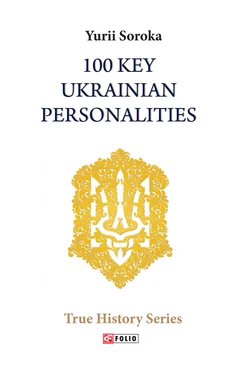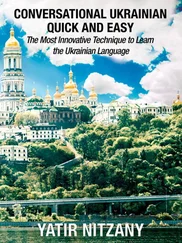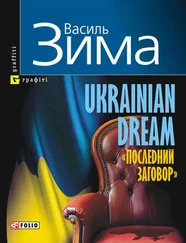Traditionally, the relations with the Byzantine Empire played a vital role in Volodymyr Sviatoslavych’s foreign policy. Being supported by Volodymyr’s warriors, Emperor Basil suppressed the feudal lords’ rebellion. In return, Volodymyr wanted the Emperor to let him marry Princess Anna. In reply, the Byzantines put forward a demand that Volodymyr should be baptized. The chronicle writes that the negotiations about the change of the state religion in Rus’ lasted for a long time but in 988, after Korsun campaign and the Byzantines’ suggestion, the prince made up his mind about baptizing by the Orthodox Christianity.
“…Then Volodymyr sent his messengers throughout the city, saying, “If anybody does not appear near the river tomorrow – a rich man or a poor one, or an old man, or a slave, – he will be my enemy…” And the next day Volodymyr went to the Dnieper with the priests from Tsargorod and from Korsun. And huge crowd gathered and went into the water… and the priests, standing, prayed. And a great joy was seen both in Heaven and on the earth that so many souls were saved…”
Volodymyr Sviatoslavych died on July 15, 1015 while preparing for the campaign against Novgorod and Yaroslav, a son of his. He was buried in the Church of the Tithes built by him in Kyiv.

Prince Volodymyr’s Baptizing. Fresco by V. Vasnetsov in the Kyiv Volodymyr Cathedral
Yaroslav the Wise (circa 978-1054)
Yaroslav, a son of Volodymyr Sviatoslavych, who was called the Wise for his balanced state policy, was born late in the tenth century. The Prince’s mother was Rognida, a Polotsk princess. As his other eleven brothers, he began to take part in ruling over Rus’ when he was little – already in 988, by his father’s order, he was appointed the governor of Rostov and later, when his elder brother died, in Novgorod. The chronicle runs as follows-
“…put Yaroslav to reign in Rostov and when the elder brother, Vysheslav, died in Novgorod, sent Yaroslav there…”.
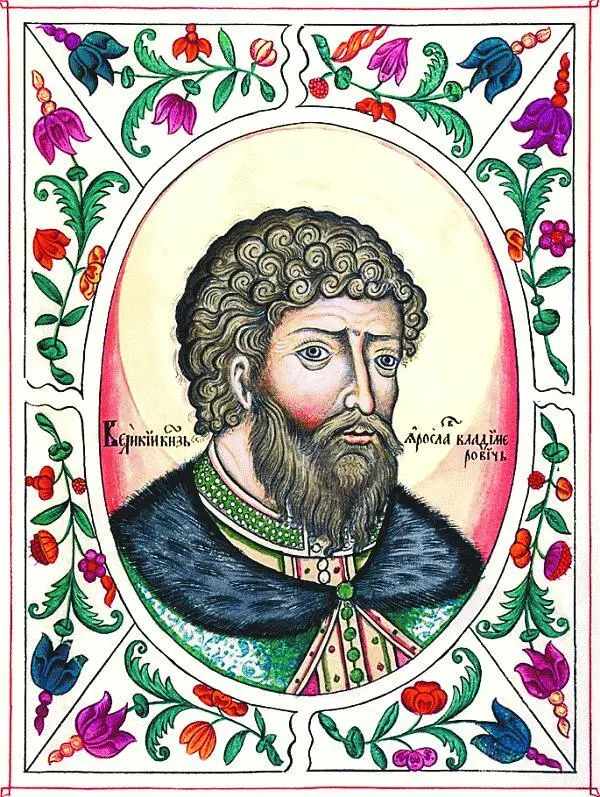
Yaroslav the Wise. A portrait from the Title reference book, XVII century
It is known that in 1014, Yaroslav gave up paying the tribute to Kyiv and Volodymyr even began to organize campaign against the disobedient son. But the prince’s death prevented another feud. It was Yaroslav, who started it and five years later, after a severe struggle for Kyiv and the death of his brothers Borys, Hlib, Sviatopolk and Sviatoslav, Yaroslav got what he wanted. While fighting for the throne, he had to oppose Yaroslav the Brave, a Polish Prince who had supported Sviatopolk.
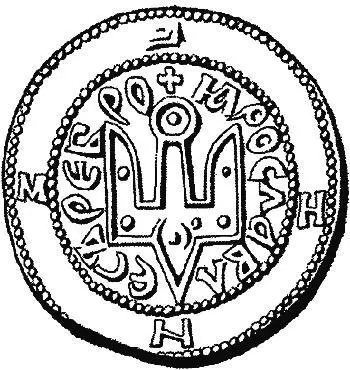
Prince’s emblem of Yaroslav the Wise
On the whole, the reign of Yaroslav the Wise was a peak period of Kyivan Rus’. He strengthened the borders and established contacts with many European countries. Yaroslav attended a lot to state building. By his orders, Christianity spread, and the chroniclers called him God-Preserved and God-Wise. Monasteries were founded, churches and cathedrals were built, sciences flourished. The Tale of Bygone years testifies-
“Yaroslav liked books and having copied many of them, he placed them in Saint Sophia Church”.
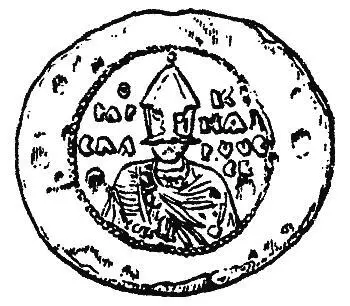
Yaroslav Volodymyrovych’s seal, found in Novgorod
That brief note informs us of Yaroslav the Wise’s legendary library that has been raising historians’ interest. Some scholars devoted a number of years to search for the library but it has never been found. Some people believe that the library perished, when the Mongolian Tatars attacked Kyiv in December, 1240, others think that it was distributed among different book collections after Yaroslav’s death. Quite recently, there appeared a version that it was hidden in the dungeons of Mezhigorsky monastery. Still the information has not been proved.
The period of Yaroslav the Wise’s reign featured the beginning of work on the norms of law in ancient Rus’. The work resulted in compiling the so-called Yaroslav’s Pravda, the earliest part of Rus’ka Pravda . Yaroslav’s ramified international relations were supported by his family members’ marriages to the representatives of the ruling dynasties of the Western European countries. Besides the well-known marriage of Princess Anna to the King of France, Yelizaveta, a daughter of Yaroslav, became Queen of Norway, Anastasiya – Queen of Hungary. Polish Prince, Kazimir, married Yaroslav’s sister, Dobroneha, and so was connected with Kyivan Rus’ by the dynasty marriage.
Yaroslav the Wise died in 1054 and was buried in Sophia cathedral in Kyiv. There is an entry in The Tale of Bygone Years about that-
“Yaroslav, the Prince of Rus’, died. When he was still alive, he gathered his sons together and told them, “Now that I leave this world and you, my sons, live in love for each other since you all are brothers and have the same father and the same mother…”
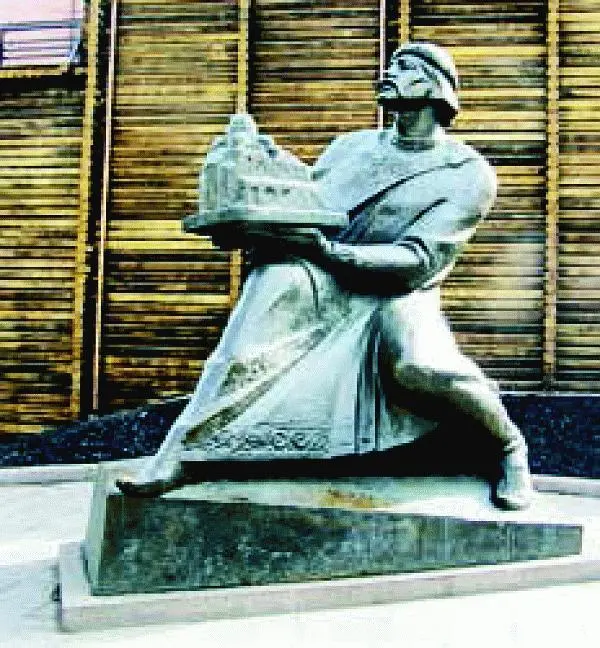
Monument to Yaroslav the Wise. Kyiv
Anna Yaroslavna (1024 (1025) – after 1075)
Anna, one of three daughters of Yaroslav the Wise, was probably born in 1024 or 1025. Her destiny was rather common for that time – all three daughters of the Prince of Kyiv – Yelizaveta, Anastasiya and Anna became the queens of European monarchies. Yelizaveta married the Norwegian Prince Harald the Ruthless, whereas Anastasiya took the Hungarian throne.
The future Queen of France had quite good education. She was literate, studied history, foreign languages, mathematics and painting. It is known that Anna was fluent in several languages, in particular, in Old Slavic and Greek.
In 1048 the ambassador from the widower Henry I came to Kyiv for the second time (it is known that at first Prince Yaroslav dismissed the request to let his daughter marry Henry). That time the agreement was reached.
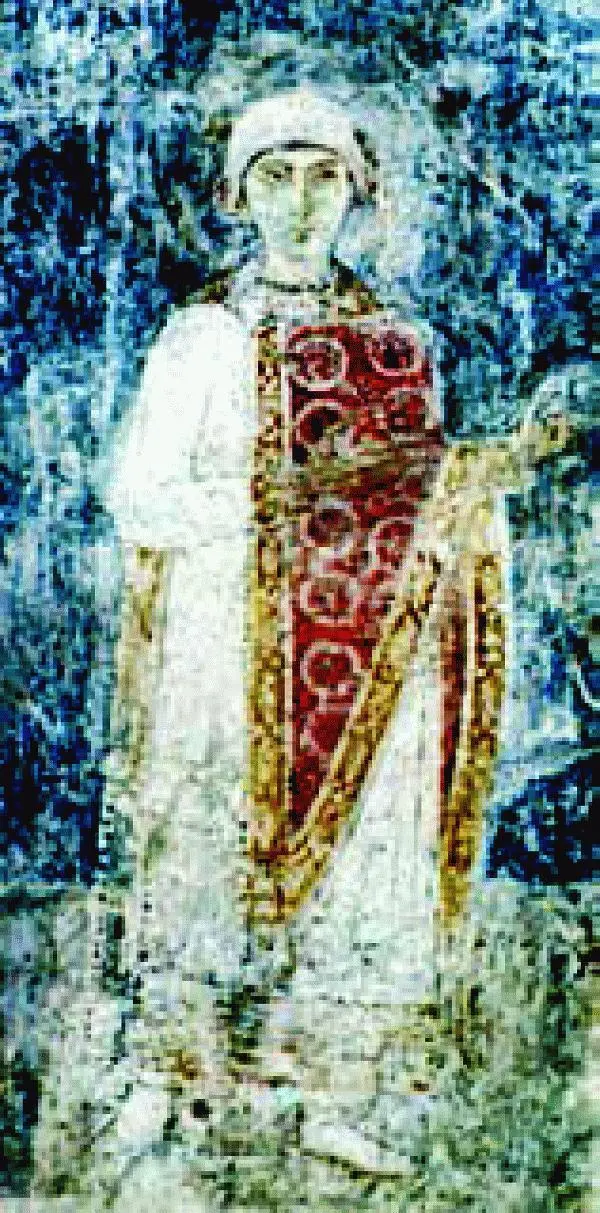
Anna Yaroslavna (Anna of Kyiv). A fresco in the Kyiv Sophia Cathedral
The arrival of the fiancée of the King to France was organized pompously. Henry I set off to Reims to meet Anna. There in May 1049, at the Сathedral of Sacred Cross the coronation was held and Anna Yaroslavna became the queen of France. It is interesting that on the marriage document the daughter of Kyivan Prince wrote her name, while Henry І put a cross instead of a signature. In turn, Anna Yaroslavna surprised the king’s guard when she refused from taking the oath on the Latin Bible. She took the oath on the Gospel written in the Old Slavic language. Later that book got the name of the Reims Gospel and all the following kings of France took the oath on it, without suspecting the Kyivan origin of the book.
The years of Anna’s rule coincided with the economic and cultural booming period in France, but even in those conditions French researchers cite the lines from her letter to father, “What a Barbarian country did you send me to, father? Here houses are dull, churches are ugly and traditions are horrible…” From this letter it is possible to understand that for a well-educated Ukrainian, who had grown up in the conditions of the Slavic culture, it was hard to adapt to the conditions of the French elite of the time. However, the fact that Anna was the only woman in Europe, who corresponded with the Pope, also confirmed her high level of education.
Читать дальше
